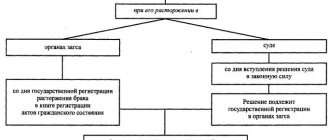How is a court decision made?
When receiving a decision, you need to take into account the additional requirements of the Code of Civil Procedure of the Russian Federation, since they will differ significantly for courts of general jurisdiction and magistrates. Let us briefly examine the general rules for making, announcing and preparing court decisions in civil proceedings. If the case is heard by a court of general jurisdiction, the procedure is as follows:
- according to Art. 193 of the Code of Civil Procedure of the Russian Federation, after the decision is made and signed, the court is obliged to announce it to the participants in the process;
- the court has the right to announce only the operative part of the decision, i.e. indicate the satisfaction of the claim or refusal, the list and amount of awarded amounts, and other claims;
- Simultaneously with the announcement of the act, the court is obliged to explain its contents, the procedure and deadlines for appeal, and the date of production of the act in its final form.
The law allows courts to delay the finalization of the decision. This is quite logical, since the decision must indicate all the arguments and objections of the parties, justify the conclusions, and make references to the case materials. If the judge had been doing this in the deliberation room, he would have had to wait several days for a decision.
Norms of the Code of Civil Procedure of the Russian Federation
I have already talked about how to behave correctly in court, including after a decision has been made, in another article. To avoid delaying the process, the Civil Procedure Code provides for the following rules:
- the final decision must be made within 5 days;
- if a citizen was present at the announcement of the decision in the operative part, the court is not obliged to send him a copy (in practice, court staff try to send the document to each participant);
- if a citizen did not take part in the announcement, a copy of the decision must be sent to him;
- When a default judgment is made, it is sent to the last known place of residence of the defendant.
Find out more The court does not issue a writ of execution what to do
In the magistrate's court, the procedure for announcing and issuing decisions is different. According to the same article. 193 of the Code of Civil Procedure of the Russian Federation, the magistrate reads out the act in the operative part. At the same time, the right to submit an application for a decision in a reasoned form is clarified. If such an application is not received, the judge will not issue a reasoned decision at all.
The duty of the magistrate to draw up a reasoned conclusion is enshrined in Article 199 of the Code of Civil Procedure of the Russian Federation if the participants in the process receive an application:
- within 3 days after the announcement of the operative part, if the parties or their representatives were personally present at the meeting;
- within 15 days if these persons did not take part in the meeting.
Having received the application, the judge is obliged to prepare a full decision within 5 days. To review the case materials and get a copy of them, use our step-by-step instructions. I will tell you below about the rules for drawing up and issuing decisions specified in the Code of Civil Procedure of the Russian Federation.
The court can announce only the operative part, and take up to 5 days to complete the document in full.
How long can this be done after the issuance?
Expert opinion
Kuzmin Vasily Stanislavovich
Lawyer with 6 years of experience. Specialization: criminal law. More than 3 years of experience in developing legal documentation.
Citizens who are participants in the case but did not come to the meeting receive the document by mail. The department office sends them within three working days.
In addition, the results can be posted on the official website of the court or on the State Automated System “Justice” platform. To view, you will need a device with an Internet connection and a registered government services account. In this case, files must be stored with limited access.
Note! If some complex issue is being resolved, the decision is not drawn up immediately. Therefore, it will also not be possible to issue it immediately. In such a situation, within one month from the date of drawing up the document, you can write a petition in order to obtain a copy.
Why do you need to get a court decision?
A court decision can be obtained in order to leave it as a memory of the past process. Naturally, this is not the reason that forces citizens to go to court and demand familiarization or an extract from the decision. The need to obtain may be related to:
- with verification that the judge did not make a mistake when calculating the collected funds;
- for the purpose of filing a complaint with the appellate authority;
- to clarify whether all the arguments and documents studied during the trial were correctly reflected by the court in the decision;
- for transfer to the principal if the case was conducted by a representative under a power of attorney.
No more than 30 days are given to file a complaint. It is important that this period begins to run from the moment the act is prepared in its final form. Consequently, until the judge or office staff prepare a full-fledged decision, the period for appeal will not begin to run. To record this period, the act always indicates the date of its production in its final form.
Find out more How to declare a representative in court: step-by-step instructions
Between the moment the document is finalized and the participants in the case receive it, it can take from 1-2 days to several weeks. Therefore, you need to think about obtaining a decision immediately after leaving the last court hearing. Below I will tell you how to do this as quickly as possible.
What should I do to receive it?
Even if the judge announced his decision and formalized it in writing, it does not immediately enter into force. Sometimes you have to wait quite a long time for the reason that the losing party did not accept defeat and began to challenge the judicial act. If so, then the appeal stage will begin.
A certain period of time is allotted for it, equal to 30 days. If there is no complaint, then after this period the decision acquires legal force. This means that it’s time to go to the civil affairs office and get a collection sheet there.
We receive a court decision quickly and without red tape
In order not to miss the deadline for appeal, and to receive a court decision as quickly as possible, we follow the step-by-step instructions:
- When a decision is announced, we listen carefully to the time frame within which a reasoned decision will be made;
- the next day after the expiration of this period, we contact the court office with an application for the issuance of an extract from the decision;
- if an office employee immediately issues a document, we check the required details and proper execution;
- if the issuance of a document is refused, we insist that the application be officially registered and assigned a number.
Naturally, you need to apply during business hours and office hours, otherwise you will have to appear in court again. The work schedule of the court office can be found through the State Automated System “Justice” portal.
Those who often deal with courts understand the workload of office staff. They have to fill out a lot of documents every day, including judges’ decisions. Therefore, I do not recommend immediately entering into a conflict if the decision is not ready on the first day appointed by the court. Register the application to secure the date of application, and then find out when you can come to pick up the completed document. If, due to your employment, you are unable to come to court in person again, you can indicate in your application that the decision will be sent by mail.
If the document is issued immediately, please pay attention to the following points:
- correspondence of data about the participants in the process, the judge, the case number, and other information;
- indication of the date of drawing up the reasoned decision (unscrupulous office staff may deliberately indicate an earlier date, which may result in missing the deadline for appeal);
- the presence of all serial pages in the decision, lived and certified by the seal and signature of the official.
Find out more How to behave correctly in court as a defendant
The original decision is always found in the case materials. Therefore, you may be given a full copy of the decision, or an extract from it. In any case, the copy must be certified by specialists from the court office. After the decision comes into force, an application for a writ of execution will be required. To do this, you need to submit an application to the court that issued the deed. For information on how a writ of execution is issued and what you need to check in its contents, read the link.
Be sure to sign the application and submit it to the office with the incoming number and date
Why do you need a writ of execution?
A defendant who has lost a case does not always strive to fulfill the obligations imposed on him by the court as quickly as possible. The dispute has been resolved, a decision on it, and it is mandatory for both organizations and citizens. But for various reasons there is no real implementation.
This is precisely what the enforcement service, the FSSP, is intended for. A solution alone is not enough; another document is needed. Based on it, as well as the claimant’s application, the bailiff will open a case and begin to perform his official duties. They are to ensure proper execution.
What to do if the deadline for issuing a decision is delayed
If you did not receive a copy of the decision upon your first and repeated appeal, you can continue going to court, or:
- submit an application addressed to the chairman of the court (you must attach a copy of the decision in operative form and the previously submitted application);
- file a complaint against the decision. in order to comply with the 30-day deadline (the complaint can indicate disagreement with the verdict, and provide detailed justification after reading the reasoned decision).
In any case, the main document for you will be an application for a copy or extract of the decision, registered in the office. The chairman of the court is obliged to consider each appeal. If the arguments about red tape or delays are confirmed, the perpetrators will face disciplinary action, and your application will be satisfied as quickly as possible.
You can download a sample application for a court decision in the appendix to the article. If you have any questions or need help in preparing documents, you can get advice from our lawyers by phone or through the feedback form. Contact us, we will provide free advice on most issues and help you defend your interests in the courts.
You can also suggest topics for future articles by email. We always support feedback from readers, so we will consider all suggestions and advice. Together we can do more!
Issuance procedure
The law establishes a list of cases when the court sends copies of rulings to the parties without fail. If this does not happen, the interested person can request it from the materials of the civil case in court.
If a citizen is in doubt about how to formulate his request, he can submit an application to familiarize himself with the case: it lists all the procedural actions of the parties and the court.
Watch the video. On what issues does the court make rulings?
When a bank sues
Usually, after one or two delays, the lender does not take serious measures. Most often, at first everything is limited to calls and letters reminding about the payment: perhaps the borrower simply forgot about the payment. If non-payment becomes systematic, the bank connects its collection service and can contact a collection agency under an agency agreement: company representatives will try to contact the borrower so that he will repay the loan to the bank. Another option for the development of events is an assignment agreement: the banking organization resells the right to collect the loan to a collection agency, and it becomes a full-fledged creditor, however, with some restrictions: it can soften the conditions, but not tighten them. Litigation is a last resort; banks do it infrequently and reluctantly: it is a lengthy process that will entail unnecessary costs.
Legal deadlines
The determination is considered to come into force at the moment of its announcement. If it concerns the fate of the claim (abandonment, termination or suspension of proceedings), then copies must be sent to the parties within 3 days after such a decision is made, provided that they did not participate in the consideration for objective reasons. And those present will be given the definitions on the spot.










